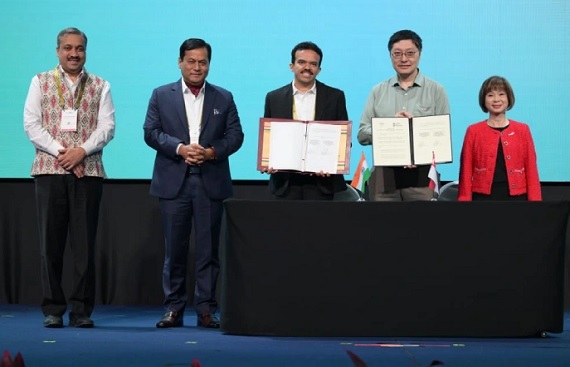India, Singapore Ink LOI for Green Shipping & Digital Corridor
By
siliconindia | Wednesday, 26 March 2025, 04:38 Hrs

India and Singapore have taken a crucial step in maritime cooperation with the signing of a Letter of Intent (LOI) on Green Shipping and Digital Corridor Collaboration. The pact was signed in the presence of Sarbananda Sonowal, Union Minister of Ports, Shipping and Waterways (MoPSW), and Amy Khor, Senior Minister of State, Ministry of Sustainability and the Environment and Ministry of Transport, Singapore. The LOI was signed on behalf of R Lakshmanan, Joint Secretary, MoPSW, and Teo Eng Dhi, Chief Executive of the Maritime and Port Authority of Singapore.
The agreement is centered on maritime digitalization and decarbonization activities and is meant to increase cooperation between the two countries in these areas. Under the initiative, India and Singapore will work together to identify stakeholders relevant to the initiative and towards developing a memorandum of understanding for a Green and Digital Shipping Corridor (GDSC) between the two countries. The collaboration is likely to promote the development and use of zero or near-zero greenhouse gas emission technologies and digital solutions in shipping. India's technology in information and green marine fuel manufacturing, combined with Singapore's position as a world transshipment and bunkering center, presents a strategic partnership for driving sustainability and efficiency in the shipping industry.
Addressing the ceremony, Sarbananda Sonowal highlighted the importance of this partnership in upgrading maritime operations and encouraging initiatives in green shipping. He said that the Singapore-India Green and Digital Shipping Corridor would fuel innovation, speed up the use of low-emission technology, and deepen digitalization in the maritime sector. Acknowledging India's technological prowess and green fuel opportunity, he was optimistic that the collaboration would create new standards for maritime sustainability. The minister again assured that India would develop a future-proof maritime ecosystem for both countries and the world at large.
On the fringes of Singapore Maritime Week, Sonowal also had a bilateral meeting with Brigit Gijsbers, Vice Minister of the Ministry of Infrastructure and Water Management, Netherlands, with a view to enhancing the existing Memorandum of Understanding for Maritime Cooperation. The issues ranged across areas such as dredging, inland vessel technology, and water management where Dutch expertise could be utilized to make India's inland waterways more efficient. Both leaders discussed possible partnerships with Dutch maritime schools and training facilities to reskill India's inland waterways employees in sustainable navigation techniques, digital waterway management, ship maintenance, and dredging activities.
Another major subject of discussion was the potential development of a Green Shipping Corridor between the Port of Rotterdam and India's main ports, including Deendayal Port (Kandla) and VoC Port (Tuticorin). Sonowal was upbeat about deepening maritime ties with the Netherlands and recognized the efforts of Dutch enterprises such as Damen Shipyard and Van Oord in terms of investment and technology for India's maritime economy. He underlined that Dutch proficiency in river engineering, dredging, and inland modular vessels would be highly valuable for India's inland waterways, especially along the Brahmaputra and Barak rivers. By incorporating advanced dredging techniques and LNG-powered river transport solutions, India aims to enhance cargo movement efficiency, making inland waterways a more viable and sustainable transportation mode.
Sarbananda Sonowal also inaugurated the ‘India Pavilion’ at Singapore Maritime Week alongside Amy Khor, marking India’s strong presence in the global maritime sector. Additionally, he inaugurated the IRClass Pavilion, highlighting India’s growing role in maritime classification and regulatory frameworks. Referring to the India Business Roundtable, Sonowal discussed India's quick rise as a sustainable maritime hub based on digital innovation and strategic alliances. He stressed the turn-around reforms made by the Prime Minister Narendra Modi-led government, which have made India a desirable hub for clean energy-powered ports, shipbuilding excellence, and reduced carbon shipping.
Sonowal visited the Singapore Cruise Centre during his trip to understand the infrastructure and operational efficiencies behind Singapore becoming a major cruise tourism hub. Similar terminals are planned to be replicated in important destinations like Goa, Mumbai, and Chennai by India to increase its cruise tourism sector. The minister also had meetings with major officials of the Singapore Chamber of Maritime Arbitration (SCMA) and senior industry leaders of the Netherlands' maritime industry to discuss additional areas of cooperation.
The India-Singapore cooperation under the LOI demonstrates mutual commitment to furthering maritime sustainability and digitalization. Both nations want to establish a new benchmark for maritime efficiency and sustainability through building on each other's strengths. Likewise, India's partnership with the Netherlands reflects the power of international expertise in defining India's inland waterway infrastructure and green shipping policies. These initiatives reflect India's larger vision of economic development and environmental stewardship, making India a central player in the international maritime industry.
